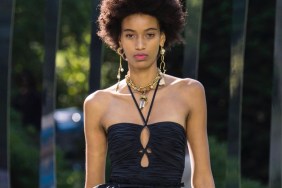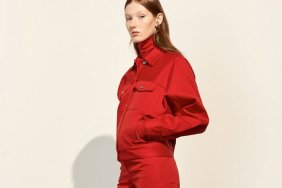Who made your clothes? If that sounds like a simple question, just try and answer it — I bet you’ll come up with the name of a fashion brand, a label, a retailer. Ok.
But how did that dress end up hanging on the rack at a clothing store? Most of us have no idea where the fabric was grown, how it was spun into yarn, how it was dyed and then sewn together into a garment. In our current fashion system, the true origins of our clothing are hidden; the only thing visible is the big glossy brand.

Exactly a year ago, many of us recognized how little we knew about even the most basic aspects of the clothing supply chain. It took a tragedy. On April 24, 2013, the factory fire in Rana Plaza in Bangladesh killed 1,133 garment workers and wounded 2,500 more. It was one of the worst industrial accidents in history.
Today, we’re marking the anniversary of Rana Plaza with Fashion Revolution Day, a project founded by designers Carry Somers and Orsola de Castro. The campaign asks supporters to wear their clothing inside out, snap a picture and share it on social media with the hashtag, #InsideOut. It’s a small gesture with a simple, modest goal: to get people to start asking questions about who made their clothes.

Below, I’ve assembled some of some of my favorite pieces of media about Fashion Revolution Day (and beyond). If you’re looking for stuff to click on today, try these links:
Join the Revolution Against Mindless Fashion Consumption — BusinessOfFashion
“We really don’t need — or often actually really want — the majority of clothes we buy. But because they are so cheap, we chuck them into the shopping basket feeling as though we’ve snagged ourselves a bargain, oblivious to the fact that this mindless consumption is giving retailers and high street chains carte blanche to continue putting in orders to their suppliers that are impossible to achieve without inhumane amounts of overtime in return for $68 per month.”
Ethical fashion is feminist fashion — DazedDigital
“85% of Bangladeshi factory workers are women. While western feminism is often quick to focus on the inequality around us, there is often a perverse blindness as to the impact of our purchasing power and privilege further afield. When feminist women shop in stores that directly profit from the exploitation of other disenfranchised women, we betray our own politics in a grotesque case of wilful ignorance.
The effects of globalisation are not uniquely a feminist problem, but they play into an international sphere of cultural inequality. The reasons why the significant majority of factory workers are women are not exclusive to Bangladesh: women all over the world have the poorest access to education and the least lucrative jobs.”
8 Things You Need To Know About Fashion Revolution Day — Marie Claire
“We realized that people across the fashion industry weren’t talking to each other about this before. There wasn’t one platform uniting factories, designers and journalists. We’re calling on brands to be more transparent and to look at the people in their entire supply chains. We want to raise awareness of the true costs of fashion and its impact at every stage in the process of production and consumption. When producers are faceless it costs lives, so we want to give a voice to everybody in the supply chain. We also want to use Fashion Revolution Day to celebrate everybody who’s already involved in creating a more sustainable future.”
Sustainable fashion panel discussion — SHOWstudio
To support Fashion Revolution Day, SHOWstudio hosted one of its signature live panels on the subject of sustainability and ethics in fashion. Moderated by Lou Stoppard, with panelists Dilys Williams and Renee Cuoco from Centre for Sustainable Fashion, Katherine Poulton from The North Circular, jeweler Michelle Lowe-Holder and Abigail Murray of Designer Jumble.
You can watch it here:
“BangLaFresh #Insideout @Fash_rev” — Directed by Pol Ponsarnau
From Fashion Revolution Day Germany, a ridiculous but enjoyable video from the rapper Bang La Fresh. Features a Karl Lagerfeld cameo, sort of.
Watch it?
Inside Fashion’s New Frontier — Vogue.co.uk
Former model and Model Alliance founder Sara Ziff traveled to Bangladesh to make a documentary about the working conditions in garment factories.
“In 2012, two months after I formed the Model Alliance, I read a news report about the brutal torture and murder of Aminul Islam, a Bangladeshi labour activist who was organising workers in a factory that made clothes for various brands including Tommy Hilfiger… As a model who had worked as a face of that brand, I was shocked and outraged, and I decided to go to Bangladesh to see the conditions on the ground.”
12 Ways to Stand Up for Workers’ Rights on Fashion Revolution Day — Ecouterre
“Help the families and victims of the disaster by donating to the Rana Plaza Donors Trust Fund (managed by the International Labour Organization). You can also contribute to a number of environmental and labor groups that are fighting the good fight, including the Clean Clothes Campaign, Greenpeace, the International Labor Rights Forum, United Students Against Sweatshops, and Worker Rights Consortium.”
Ever Magazine Issue 3 / Ever Conscious
Ever is a sustainability think tank and publication. Issue 3, available for free download, is dedicated to conscious consumerism and features interviews with ethical designer Bruno Pieters, model turned eco-activist Amber Valletta, and consultant Julie Gilhart.
We Asked the World’s Top Fashion Schools: How Are You Teaching Sustainability to Tomorrow’s Designers? — theFashionSpot
“The designer John Patrick has been on the forefront of sustainability in fashion ever since he first launched his brand, Organic, in 2004. As theFashionSpot’s April guest editor, JP wanted to find out whether the next generation of designers and fashion leaders would be prepared to address issues of ethics and sustainability, and repair some of the damage that’s been done by our current system of clothing manufacturing. Together, we queried the world’s top fashion schools to find out how they are teaching sustainability to tomorrow’s designers.”
Related: Why Haven’t Big High-End Brands Embraced Ethical Fashion?







